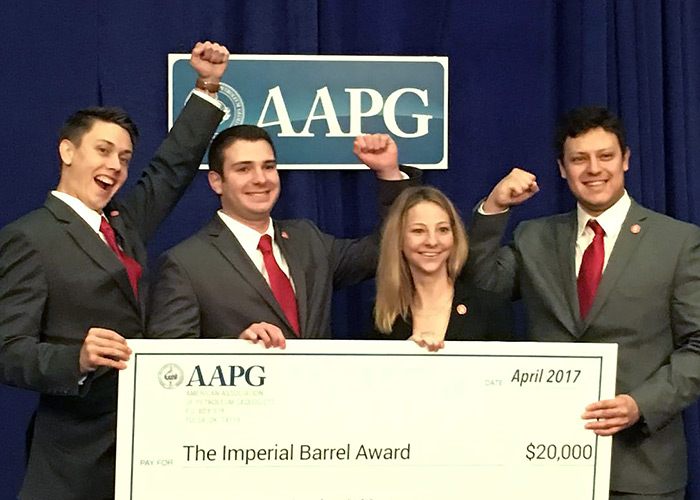Twelve Teams Participated in the Finals
A team of five UH Ph.D. and M.S. graduate students from the University of Houston Department of Earth and Atmospheric Sciences won the World Finals of the 2017 AAPG Imperial Barrel Award (IBA) Competition.
 UH Imperial Barrel Award Team Members (from left to right): Walter Reed, Eric Lunn
(Captain), Delaney Robinson, and Leiser Silva. (Team Member not pictured: Andrew Steier)
UH Imperial Barrel Award Team Members (from left to right): Walter Reed, Eric Lunn
(Captain), Delaney Robinson, and Leiser Silva. (Team Member not pictured: Andrew Steier)
Related Coverage:
AAPG Explorer
UH Energy’s Connections NewsletterThe team competed on April 1 in conjunction with the Annual Convention of the American
Association of Petroleum Geologists (AAPG) held at the George R. Brown Convention
Center in Houston, April 2-5, and attended by 7,000 geoscientists. The AAPG is one
of the world’s largest geologic societies with more than 38,000 members in over 100
countries.
AAPG’s IBA Program is an annual prospective basin evaluation competition for geoscience graduate students from universities around the world. University teams compete to win scholarship funds for their geoscience department and the international recognition that comes from competing in or winning the competition.
The UH team received the Imperial Barrel Award trophy and a check for $20,000 which will be used in the coming year to support the activities of the Department of Earth and Atmospheric Sciences and the AAPG “Wildcatters” student chapter: www.uh.edu/nsm/earth-atmospheric/student-organizations/
The UH team consisted of five EAS Ph.D. and M.S. graduate students: Delaney Robinson (Ph.D.), Walter Reed (M.S.), Eric Lunn (Ph.D., Team Captain), Andrew Steier (M.S.), and Leiser Silva (M.S.). The team’s faculty advisors included Paul Mann, John Castagna, Julia Wellner and Kurt Rudolph. Industry advisors were Mike Liebelt and Mark Richardson.
To advance to the World Finals, the UH team won their AAPG Gulf Coast Section on March 17, competing with nine other teams from Texas, Louisiana, Mississippi and Alabama: www.uh.edu/nsm/earth-atmospheric/news-events/stories/2017/0321-iba-competition.php
IBA student teams have the chance to use state-of-the-art technology on a real dataset, receive feedback from an industry panel, impress potential employers in the audience, and win cash awards for their school. A six-person judging panel of professional petroleum geoscientists selected the winning team on the basis of the technical quality, clarity and originality of presentation. The program is rigorous and contributes to AAPG's mission of promoting petroleum geoscience training and advancing the careers of geoscience students. Started by AAPG in 2006, the IBA program currently involves 455 universities in 61 countries.
In this global competition, university teams analyze a dataset (geology, geophysics, land, production infrastructure and other relevant materials) in the eight weeks prior to their local competition. Each team delivers their results in a 25-minute presentation to a panel of expert judges. The dataset the UH EAS team presented was the Taranaki basin, New Zealand. The other 11 teams participating in the finals held in April included the winners of the six international regionals outside of the U.S. and the six, U.S.-based AAPG sections.
The second place IBA finals award (Selley Cup) went to Eotvos Lorand University in Budapest, Hungary, representing the AAPG Europe Region, and the third place award (Stoneley Medal) went to Curtin University of Technology in Perth, Australia, representing the AAPG Asia Pacific Region. The remaining AAPG international regions competing in the finals were the Latin America and Caribbean Region (Universidad Industrial de Santander, Colombia), Middle East Region (Sultan Qaboos University, Oman), Africa Region (Nnamdi Azikiwe University, Nigeria), and Canada Region (University of Alberta).
The remaining U.S. AAPG sections that competed in the finals were the Pacific Section (San Diego State University), Rocky Mountain Section (Colorado School of Mines), Southwest Section (University of Texas at Dallas), Mid-Continent Section (University of Kansas), and Eastern Section (Western Kentucky University).
Financial support to cover the costs of travel and other program expenses is about $500,000 per year and makes the IBA program the single, costliest program within AAPG. Major corporate donors to the AAPG IBA program include Anadarko, Devon, Chevron, Saudi Aramco and Schlumberger.
Since 2006, 11 universities that have won the first place, Imperial Barrel Award World Finals and include University of Aberdeen (2006), University of Oklahoma (2007), Imperial College London (2008), Moscow State University (2009), Institut Francais du Petrole (2010), University of Texas at Austin (2011), University of Louisiana at Lafayette (2012), University of Utah (2013), University of Louisiana at Lafayette (2014), Royal Holloway University (2015), University of Texas at El Paso (2016), and University of Houston (2017).
History of University of Houston in the IBA Competition (2012 to Present)
- 2012 – Gulf Coast 3rd Place Finish: www.uh.edu/nsm/earth-atmospheric/news-events/stories/2012/0403_ibaCompetition.php
- 2013 – Gulf Coast 3rd Place Finish: www.uh.edu/nsm/earth-atmospheric/news-events/stories/2013/0424_aapgAward.php
- 2014 – Gulf Coast 3rd Place Finish: www.uh.edu/nsm/earth-atmospheric/news-events/stories/2014/0325-iba-competition.php
- 2015 – Did Not Place: www.uh.edu/nsm/earth-atmospheric/news-events/stories/2015/0422-iba-comp.php
- 2016 – Gulf Coast Second Place Finish: www.uh.edu/nsm/earth-atmospheric/news-events/stories/2016/0422-barrel-award.php
- 2017 – Gulf Coast First Place Finish: http://www.uh.edu/nsm/earth-atmospheric/news-events/stories/2017/0321-iba-competition.php
- 2017 –Imperial Barrel Award (First Place World Finals Finish): http://iba.aapg.org/
More information on IBA Program and Photos of the Top Three Teams: http://iba.aapg.org